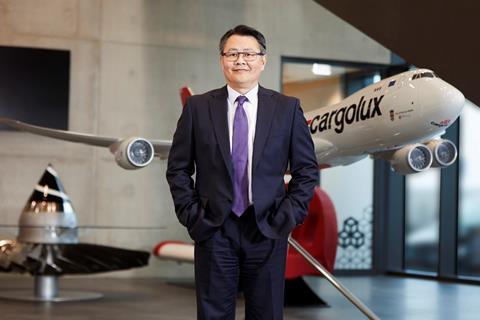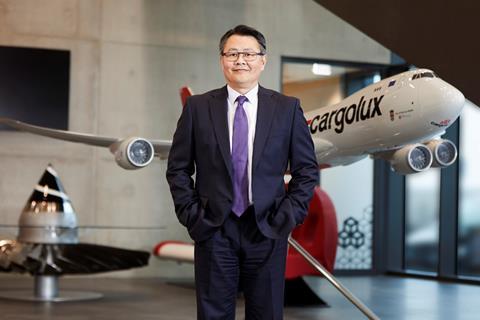Stronger Than Expected Start to 2025
Cargolux says the air cargo market has performed better than expected so far this year and adds that it will maintain its core network as a priority.
At the start of the year, the air cargo world was eyeing the next 12 months with caution as incoming US president Donald Trump during his election campaign had promised a wave of tariffs to help recalibrate the country’s trade deficits.

The U.S. implements a series of tariffs, warning of potential disruptions to trade.
Since taking office, Trump hasn’t gone back on his word, implementing various tariffs on countries from across the globe, particularly production powerhouse China. Indeed, in April, when Cargolux revealed its results for 2024, it warned that the imposition of import tariffs by the US on its trading partners was expected to negatively affect demand for air cargo capacity and disrupt traditional trade lanes.”The resulting geopolitical uncertainty coupled with the ongoing war in Ukraine and conflicts in the Middle East also impact operations as well as customer confidence,” the airline said at the time.
However, Cargolux president and chief executive Richard Forson says that the industry, including Cargolux, has actually fared better than expected.”The first half of the year has been a lot better than we had originally thought at the beginning of the year, when we thought it was going to be flat,” says Forson.
“People have been moving goods before the tariffs came in, and then also when the tariffs have been changed and then been reduced and pushed out into the future by president Trump. It has all had an impact. It provides an opportunity to front-load shipments coming in without knowing what the final position is going to be.”
To capitalise on shifting supply chains, Forson says that Cargolux has made some tweaks to its network, but not to the extent that they would impact operations to any significant extent. Looking ahead to the rest of the year, Forson says it is hard to predict how demand will develop as market performance will depend on how trade negotiations with the US progress.
With the outlook uncertain, Forson says that maintaining Cargolux’s core network will continue to be a priority, as long as routes remain profitable. “You can either think positive or you can think negative, but the market is going to be what the market is. The important thing is how you respond to those changes,” explains Forson.
“We try to maintain our core network,” he says. “Everything over and above that, we are flexible in being able to deal with that demand. For me, the breaking point is that we will not be in a position where we are going to make losses and not cover variable costs. That is a red line in the sand for us.”
Fleet update
Cargolux is one of the airlines that has placed an order for the new Boeing 777-8 freighter aircraft as it looks to replace its ageing Boeing 747-400 aircraft. In total, Cargolux ordered 10 777-8Fs with options for six more.
The project has faced delays as Boeing has come under scrutiny after a series of incidents and faced supply chain issues. As a result, the first of the model is not expected to be delivered until 2028 from an initial target of 2027.
However, Forson isn’t too concerned by the delays and says that Cargolux has some flexibility with its existing fleet.
“[The delay] doesn’t really impact us to any great extent because we had already anticipated deliveries in 2027 and 2028,” Forson explains. “So when we placed the orders, we had certain buffers built in.
“Also, we have been working very closely with Boeing, and I believe, the 777-9 certification programme is going well, which gives people confidence for the -8F. I think they seem to be turning the corner now.”
Cargolux’s current fleet is made up of 30 Boeing 747s – 14 747-8Fs and 16 747-400Fs. Forson says the -400Fs are expected to retire over the coming three to five years, but adds that despite their age, they continue to offer high levels of utilisation, with some even matching the levels achieved by the -8Fs.
Asked whether there are plans for further aircraft orders, Forson says: “We will see how the market develops and if there is long-term need for expansion.”
He explains that Cargolux would not look to chase short-term gains and will always take a long-term view of how the market will progress to avoid having to park aircraft if the market turns.
Máy Bay Trượt Khỏi Đường Băng Tại Tân Sơn Nhất: Bí Mật Đằng Sau Sự Cố
An ninh hàng không dân dụng vẫn còn lỗ hổng, đặc biệt trên không gian mạng
Các Trung Tâm Hàng Không Lớn Nhất Tê Liệt Vì Xung Đột Ở Trung Đông

